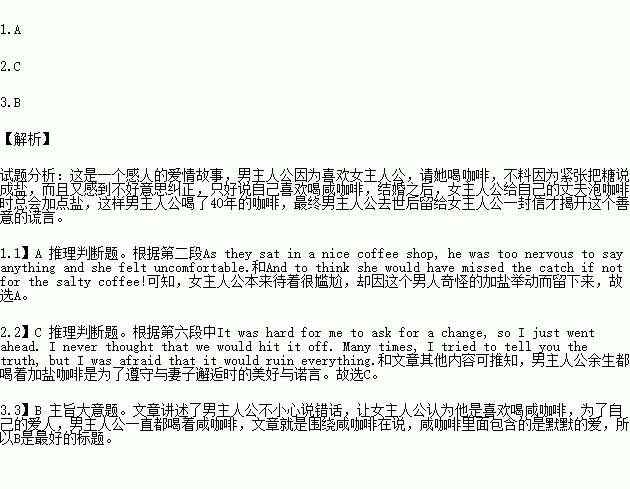题目内容
He met her at a party. She was outstanding; many guys were after her, but nobody paid any attention to him. After the party, he invited her for coffee. She was surprised, so as not to appear rude, she went along.
As they sat in a nice coffee shop, he was too nervous to say anything and she felt uncomfortable. Suddenly, he asked the waiter, “Could you please give me some salt? I'd like to put it in my coffee.”
They stared at him. He turned red, but when the salt came, he put it in his coffee and drank. Curious, she asked, "Why salt with coffee?" He explained, “When I was a little boy, I lived near the sea. I liked playing on the sea. I could feel it salty, like salty coffee. Now every time I drink it, I think of my childhood and my hometown. I miss it and my parents, who are still there.”
She was deeply moved. A man who can admit that he's homesick must love his home and care about his family. He must be responsible. She talked too, about her faraway hometown, her childhood, her family. That was the start to their love story.
They continued to date. She found that he met all her requirements. He was tolerant, kind, warm and careful. And to think she would have missed the catch if not for the salty coffee! So they married and lived happily together. And every time she made coffee for him, she put in some salt, the way he liked it.
After 40 years, he passed away and left her a letter which said:
My dearest, please forgive my life-long lie. Remember the first time we dated? I was so nervous that I asked for salt instead of sugar. It was hard for me to ask for a change, so I just went ahead. I never thought that we would hit it off. Many times, I tried to tell you the truth, but I was afraid that it would ruin everything.
Sweetheart, I don't exactly like salty coffee. But as it mattered so much to you, I've learnt to enjoy it. Having you with me was my greatest happiness. If I could live a second time, I hope we can be together again, even if it means that I have to drink salty coffee for the rest of my life.
Her tears made the letter totally wet. Someday, someone asked her, “What’s the taste of salty coffee?” “It’s sweet,” she replied.
1.What does the writer mean by saying “she would have missed the catch”?
A. She meant to leave him on their first date.
B. She thought of him every now and then.
C. She nearly misunderstood his explanation.
D. She could hardly believe this simple fact.
2.Why did the man have salty coffee all his life?
A. To change lifestyle.
B. To please his wife.
C. To keep his word.
D. To remember the past.
3.The best title for the passage might be ________.
A. A Well-kept Secret
B. Salty Coffee
C. A mistake for love
D. A Homesick Man

